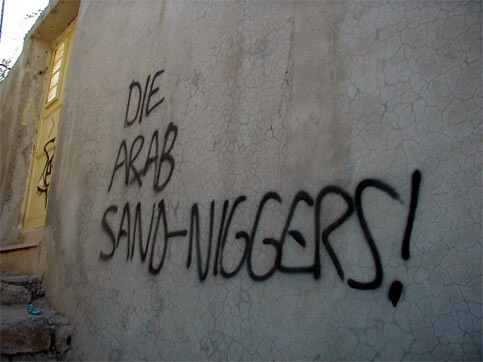
Settler graffiti in Hebron (CPT)
Hebron, 8 December 2003 — I am shocked by what I am witnessing in Palestine. No, there wasn’t anyone shot, beaten or arrested in the region I visitied during the few days I have been here. I have not heard or seen a tank, helicopter, F-16, nor a raid. Most of the Israeli checkpoints were open.
There have been no suicide bombers. I have not heard anyone shout at anyone, except for Palestinian teenagers yelling at little boys in a refugee camp to stop throwing stones at us. I haven’t seen any bulldozers leveling either Palestinian homes or olive trees to makeway for the encroaching separation “Wall of Hate” as Israeli dissidents call it, and I have not been threatened by armed settlers or anyone else. Yes, some Palestinians were killed by the army elsewhere, but I only read about it like you probably did.
It is actually so “uneventful” that journalists in my hotel are retuning home because “nothing interesting is happening”, only ordinary daily life.
I am not shocked as a first-time visitor by discovering some hidden truth about Israel and Palestine. Everything I have witnessed here has been described to me before, and most likely to you as well.
I am shocked because witnessing the oppressive reality of simple everyday life under occupation is beyond words and images. What is so frightening is that Israeli domination of Palestinian life is so undramatic. It is a quiet, yet unrelenting Israeli takeover of Palestine, acre by acre, house by house. It is, as Hanna Arndt described: the ‘banality of evil’.
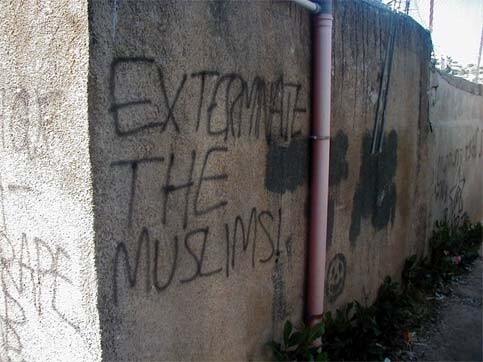
Settler graffiti in Hebron (CPT)
Yesterday I visited Hebron in the West Bank. The day remained quiet. Along the West Bank highways besides checkpoints, there were gaggles of young Jewish teenagers from North America with organizations like Birthright Israel, waiting for a ride on their settlement tours.
If stopped at a checkpoint, I am prepared to hide my Jewish identity from the Israeli soldiers, because as a rule, Jews and Israelis who are not settlers are refused entry into Palestinian cities. We Jews apparently have something to hide from each other in the West Bank. Within Israel proper, millions of Palestinians and Jews live peacefully together without soldiers, walls and curfews separating them.
An army roadblock into Hebron detoured our Palestinian mini bus down a treacherous mud road carved out of the side of the mountain. Everyone inside was terrified.
Situated in the centre of Hebron, a major city, is a small extension of the Jewish settlement Qiryat ‘Arba that starts in the suburbs. Hebron yesterday was too dull for any media news.
Downtown is an army roadblock and mobile check-point. One year ago, it expanded out three streets. Almost too boring to mention. Inside the roadblock perimeter, Palestinian businesses go bankrupt.
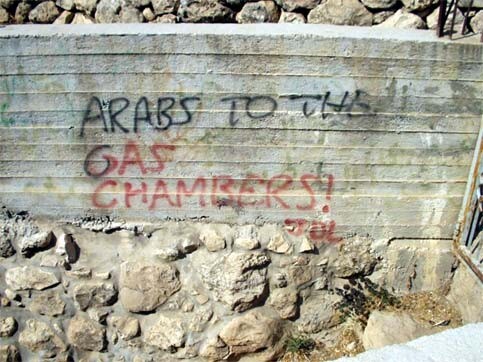
Settler graffiti in Hebron (CPT)
Army lookouts dot the Palestinian neighbourhoods - several are built on the edge of a Palestinian cemetery. They guard the settlement like a gated community, and rescue settlers who get caught outside attacking unsuspecting Palestinians.
‘Neo-Nazi’ hate graffiti by the Jewish Defense League is spray-painted in English in the cemetery: “Arabs to the Gas Chambers”. A Palestinian mother holding her two year old tells us that her 12 year old boy while playing in her garden, was hit on the head with a rock by a settler. He survived. She shows us the “Kill All Arabs” spray-painted on her front door. Her neighbour offers us tea and explains that they don’t erase it “because they will just put it on again.”
I view the cardboard covering the hole in a little window that soldiers stationed above her house shot out. Another neighbour’s outside wall is spray-painted, “Watch out Fatima, we will rape all Arab women”. The women live one block away from the Qiryat ‘Arba settlement, so it seems clear where the graffiti comes from. But they are just words, right?
It is also the ghostly silence of the once bustling neighbourhood and Hebron Central Market in the Old City - now mostly abandoned because it falls within the settlement/army perimeter. The market, closed by the army two years ago, just re-opened. Actually, maybe a dozen shops are open - hundreds are not.
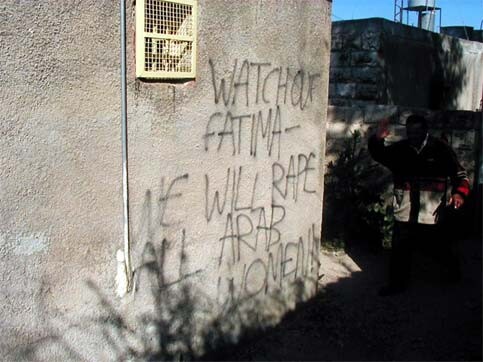
Settler graffiti in Hebron (CPT)
Intriguing lattice-style shadows paint the market alleyway, and when you look up, you realize that they come from a fence that acts as a net. A net meant to catch rocks - not fish, dropped by the settlers from the apartments above on the Palestinian shoppers and merchants below. But no rocks were dropped when I was there. Believe me, besides exchanging greetings “Saalam”, “Saalam Alekem” with passerbyís, it was a quiet Sunday.
Shlomi, an Israeli Defense Force volunteer from New Jersey and I kibitzed about him going to school in Boston near where I have family, while he checks my passport beside the settlement. From Shlomi’s check-point, I walk up a quite Palestinian street and realize that everyone has moved out, except for one old Palestinian women who looks out from her window on the second floor protected by bars, and says “Salaam” to us. Below, a Star of David is spray-painted on her front door and many other doors. Hebrew signs are pasted over the Palestinian store signs.
We meet Steve from Minneapolis, another IDF volunteer who just a few weeks ago was dancing in the same Minneapolis club that Prince plays in. He doesn’t want to be in Hebron “there’s nothing here”, but this is where his unit is stationed. Steve says that if it wasn’t for forced conscription, 2/3rds of the soldiers would never serve. It makes you wonder how seriously Israeli Jews believe in the security the occupation provides if they are being forced to serve.
The soldiers we greet all seem pleasant, bored, as they randomly check the IDs of Palestinians. Inside the settlement, a beautiful Yeshiva (Jewish religious school) is being constructed by Filipino labour. A polite French woman is showing it off to some visitors.
Yes, it was a calm day in Hebron. Pretty dull really.
But we know about when one ethnic group breaks the windows of another, paints hate messages on their doors, closes their shops, restricts their movement, patrols them with armed men, allows the most violent to enter their neighbourhoods for sneak attacks, and expells them.
We have witnessed this before, haven’t we? We remember what it means. We know what can happen next.
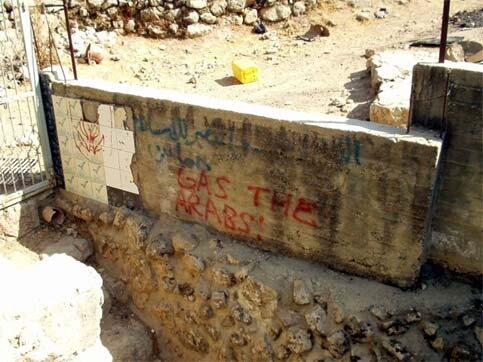
Settler graffiti in Hebron (CPT)
The marvelous aspect of history is that while predictable, it is not inevitable. We can stop the ethnic cleansing of the Palestinians, and we can prevent fascism and colonialism from defining the new Jewish identity.
We who are Jews must stop hiding. We really must come to Palestine and be a witness. Witness and also feel what Israel and the U.S. is doing in our name. Then we can make an informed decision about if we can also live with this, or not.
And if we cannot, then it is urgent to add our voices and energy in solidarity with our Israeli and Palestinian sisters and brothers who are struggling to live together without fear.
Scott Weinstein is a member of the Montreal based Jewish Alliance Against the Occupation. He is currently in Palestine working with the Palestinian Red Crescent as an RN.




